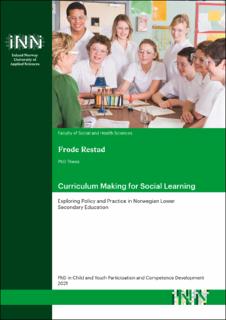| dc.description.abstract | This thesis explores the concept of social learning in international policy and research, and curriculum making for social learning in Norwegian policy and practice. The main purpose of the study is to investigate how students social learning is influenced by curriculum making at the national policy level and by curriculum making in subjects at the classroom level in Norwegian lower secondary education.
The study has a theoretical grounding in critical realism (Bhaskar, 2008a; Danermark, Ekström, Jakobsen, & Karlsson, 2011) that emphasizes social phenomena as complex and emergent from the interactions of agents, structures and mechanisms at multiple layers of reality. Wenger’s social theory of learning (Wenger, 1999) is used to analyse collective outcomes of students and teachers’ social interactions. Curriculum theory (Deng, 2017; Englund, 2015; Reid, 2016) is used to analyse teachers practices of curriculum making in subjects as instructional events in the classroom, and to analyse curriculum making at the national policy level (Chan, 2012; Hopmann, 2003; Lundgren, 2012) as negotiated practices of educational governance and control.
The study has a qualitative design building on data from policy, research and classroom interaction. Policy and literature reviews have been conducted using critical research review methodology (Suri, 2013), and methods of contents and bibliometric analysis (Bowen, 2009; Weber, 1990) to generate data on curriculum making at the national and international levels. Qualitative interviews (Brinkmann & Kvale, 2015) with students and teachers and participant observation (Heath, Brooks, Cleaver, & Ireland, 2009; Okely, 2013) of their interactions has been used to generate data on curriculum making at the classroom level.
The study identifies two main understandings of social learning as; the development of skills, and the development of community, in international policy and research. The study finds that Norwegian policymakers draw on both understandings in a compromised concept of social learning in the newly revised core curriculum. The study also identifies how students’ social learning is influenced by mechanism of personalization, peering, grouping and identification in subject teaching. Overall, these findings indicate that students’ social learning is influenced by a dual dialectic of curriculum making in policy and practice, and of social structures and students’ and teachers’ agency in the classroom. | en_US |
